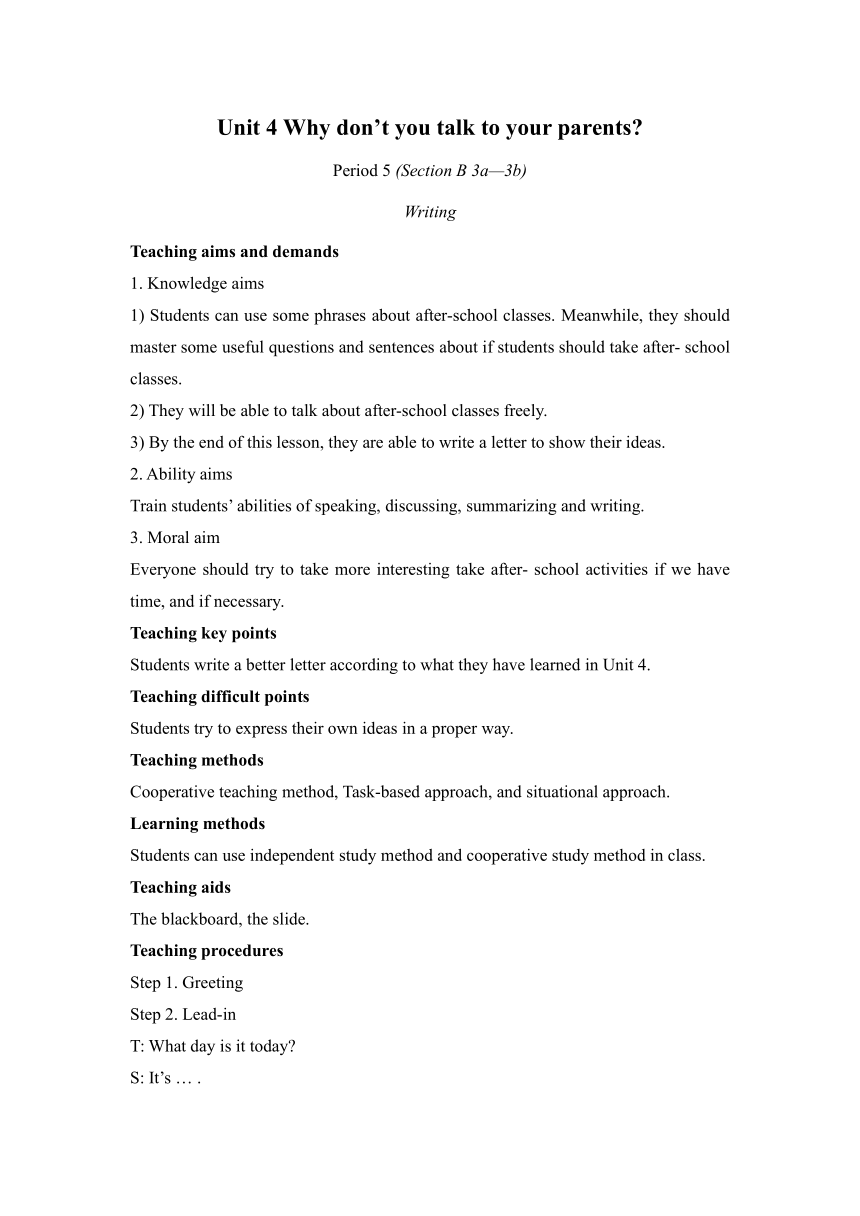人教版八年级下册 Unit4 Why don't you talk to your parents?Section B 2a-3b Self check 教案
文档属性
| 名称 | 人教版八年级下册 Unit4 Why don't you talk to your parents?Section B 2a-3b Self check 教案 |  | |
| 格式 | doc | ||
| 文件大小 | 27.0KB | ||
| 资源类型 | 教案 | ||
| 版本资源 | 人教新目标(Go for it)版 | ||
| 科目 | 英语 | ||
| 更新时间 | 2022-12-21 10:38:00 | ||
图片预览

文档简介
Unit 4 Why don’t you talk to your parents
Period 5 (Section B 3a—3b)
Writing
Teaching aims and demands
1. Knowledge aims
1) Students can use some phrases about after-school classes. Meanwhile, they should master some useful questions and sentences about if students should take after- school classes.
2) They will be able to talk about after-school classes freely.
3) By the end of this lesson, they are able to write a letter to show their ideas.
2. Ability aims
Train students’ abilities of speaking, discussing, summarizing and writing.
3. Moral aim
Everyone should try to take more interesting take after- school activities if we have time, and if necessary.
Teaching key points
Students write a better letter according to what they have learned in Unit 4.
Teaching difficult points
Students try to express their own ideas in a proper way.
Teaching methods
Cooperative teaching method, Task-based approach, and situational approach.
Learning methods
Students can use independent study method and cooperative study method in class.
Teaching aids
The blackboard, the slide.
Teaching procedures
Step 1. Greeting
Step 2. Lead-in
T: What day is it today
S: It’s … .
T: The day after tomorrow is Saturday. What do you usually do on weekends
S: …
T: Some of you usually go to take after-school classes. When we talk of after-school classes, what words can you think of
Step 3. Idea expression
Some students are bored with after-school classes. Some think it is very good for their development to take after-school classes.
What are your opinions
Step 4. Structure showing
Try to write two paragraphs. First, say if you agree or disagree. Then, explain why.
Step 5. Writing
Write a letter to the magazine to express your opinions on after-school classes for children.
Dear ... ,
I don’t really agree with... because...
Although some parents are right about ... , I think children should ...
In my opinion, it is important for children/parents to...
I believe it is better if children/parents ... so that...
Perhaps children/parents should/could...
If children ... , they will...
Step 6. Communication
Choose two or three students read their letters and ask others to listen to them carefully. Write down the sentences you like and correct the mistakes that they made.
Step 7. Summary
Period 5 (Section B 3a—3b)
Writing
Teaching aims and demands
1. Knowledge aims
1) Students can use some phrases about after-school classes. Meanwhile, they should master some useful questions and sentences about if students should take after- school classes.
2) They will be able to talk about after-school classes freely.
3) By the end of this lesson, they are able to write a letter to show their ideas.
2. Ability aims
Train students’ abilities of speaking, discussing, summarizing and writing.
3. Moral aim
Everyone should try to take more interesting take after- school activities if we have time, and if necessary.
Teaching key points
Students write a better letter according to what they have learned in Unit 4.
Teaching difficult points
Students try to express their own ideas in a proper way.
Teaching methods
Cooperative teaching method, Task-based approach, and situational approach.
Learning methods
Students can use independent study method and cooperative study method in class.
Teaching aids
The blackboard, the slide.
Teaching procedures
Step 1. Greeting
Step 2. Lead-in
T: What day is it today
S: It’s … .
T: The day after tomorrow is Saturday. What do you usually do on weekends
S: …
T: Some of you usually go to take after-school classes. When we talk of after-school classes, what words can you think of
Step 3. Idea expression
Some students are bored with after-school classes. Some think it is very good for their development to take after-school classes.
What are your opinions
Step 4. Structure showing
Try to write two paragraphs. First, say if you agree or disagree. Then, explain why.
Step 5. Writing
Write a letter to the magazine to express your opinions on after-school classes for children.
Dear ... ,
I don’t really agree with... because...
Although some parents are right about ... , I think children should ...
In my opinion, it is important for children/parents to...
I believe it is better if children/parents ... so that...
Perhaps children/parents should/could...
If children ... , they will...
Step 6. Communication
Choose two or three students read their letters and ask others to listen to them carefully. Write down the sentences you like and correct the mistakes that they made.
Step 7. Summary
同课章节目录
- Unit 1 What's the matter?
- Section A
- Section B
- Unit 2 I'll help to clean up the city parks.
- Section A
- Section B
- Unit 3 Could you please clean your room?
- Section A
- Section B
- Unit 4 Why don't you talk to your parents?
- Section A
- Section B
- Unit 5 What were you doing when the rainstorm came
- Section A
- Section B
- Review of Units 1-5
- Unit 6 An old man tried to move the mountains.
- Section A
- Section B
- Unit 7 What's the highest mountain in the world?
- Section A
- Section B
- Unit 8 Have you read Treasure Island yet?
- Section A
- Section B
- Unit 9 Have you ever been to a museum?
- Section A
- Section B
- Unit 10 I've had this bike for three years.
- Section A
- Section B
